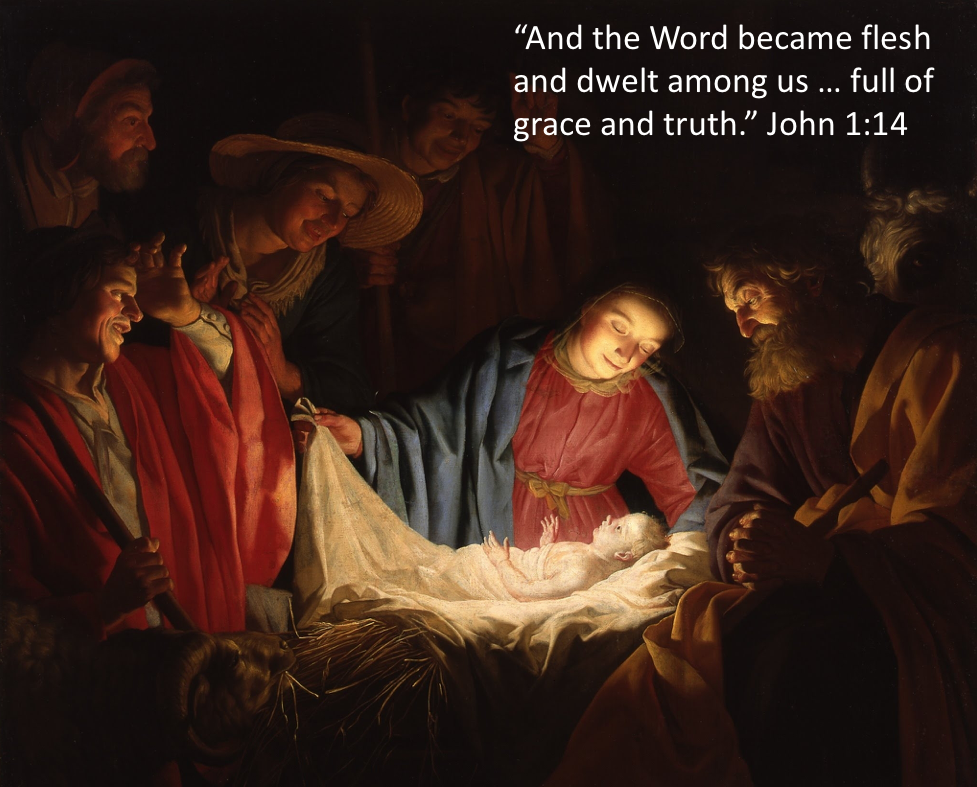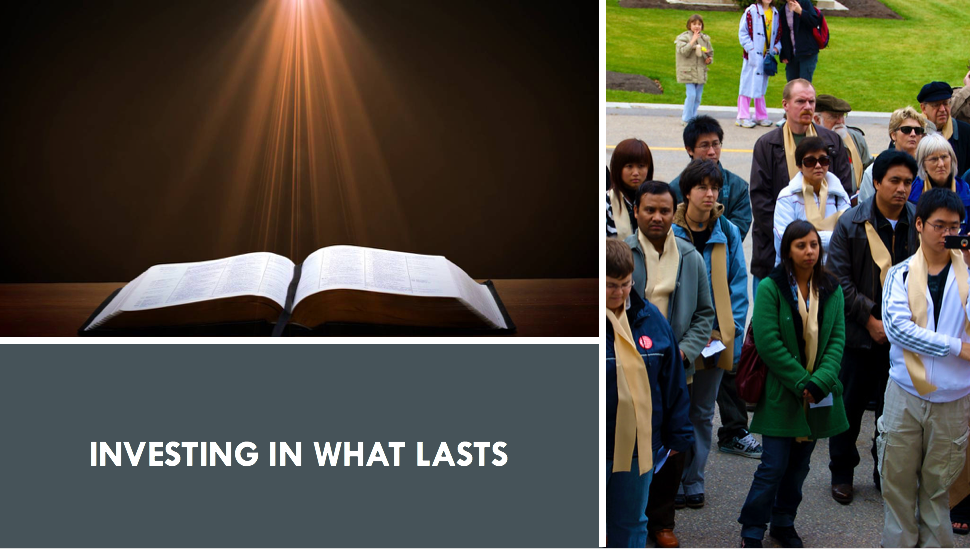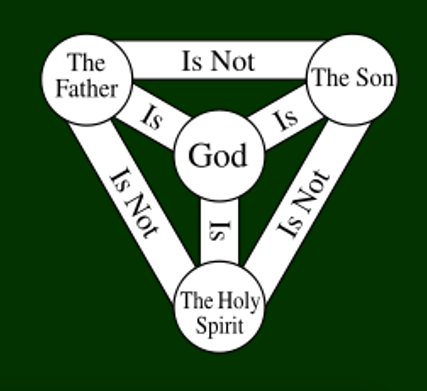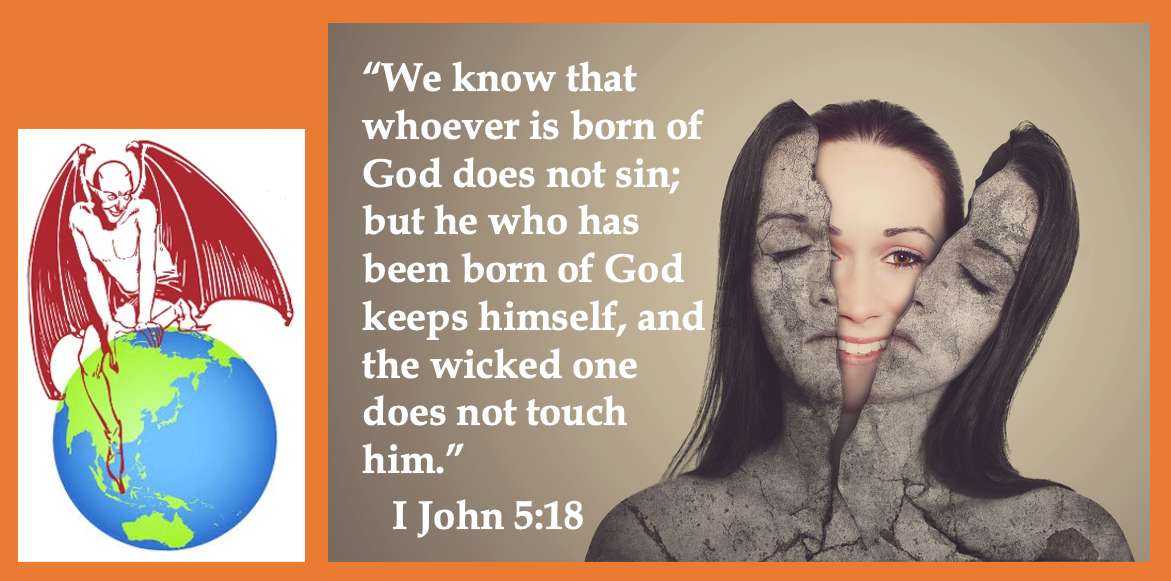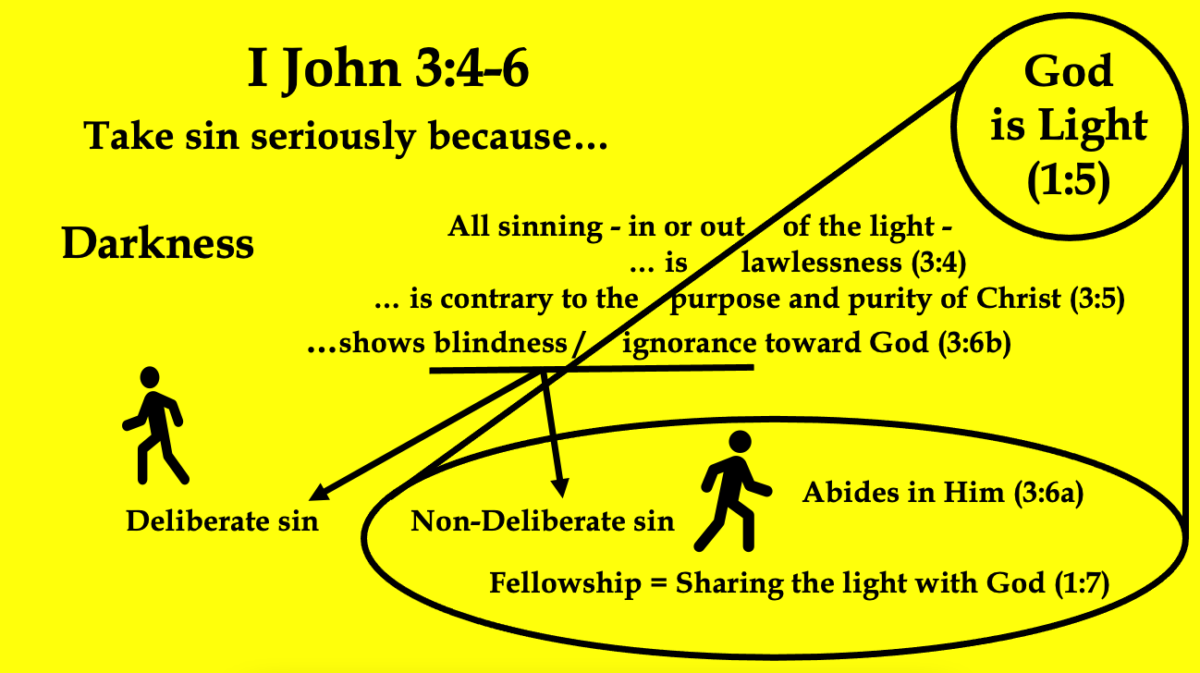“For God so loved the world that He gave His only begotten Son, that whoever believes in Him should not perish but have everlasting life.” John 3:16
The world often evaluates people by their outward appearance. When we become Christians, God wants us to start to look more at the spiritual part of people rather than how they look on the outside. After all, that is how God looks at us. The Bible says, “The Lord said to Samuel, ‘Do not look at his appearance or at the height of his stature…for the Lord does not see as man sees; for man looks at the outward appearance, but the Lord looks at the heart’” (1 Sam. 16:7).
We are to be more concerned about where people are going to spend eternity. As we grow in the Lord, we start thinking, “I wonder where this person is at spiritually? I wonder if he or she knows Jesus?” Let me ask you, “Do you see yourself as an ambassador for Christ or a customer for Christ? Do your see yourself as a giver or a taker?” God wants every one of us who are believers to give others the best news on planet earth regarding His Son, Jesus Christ.
We meet different kinds of people every day, don’t we? There are boxing, basketball, and volleyball fans. There are little, big, older, younger, middle-aged, married, single, and divorced people. There are educated, illiterate, working, and unemployed people. There are farmers, businessmen, housewives, or househusbands. There are black, brown, and white people – all these many kinds of people in the world.
Some of you can talk computers, internet, Facebook, blogs, Twitter, Instagram, Snapchat, Tik Tok, Skype, Google Chat, etc. Others of you can talk guns, hunting, and fishing. Some of you can talk cars and mechanics. Some can talk agriculture or administration, schools and education, healthcare and insurance, music and sound equipment, fashion or health foods, basketball. You can talk to your friends and peers. Some of you like to talk about the good ole days when you grew up. And on and on and on. I cannot talk intelligently about all those subjects. A couple of them, yes. But not all of them. But many of you can and do. This is why it is so important that you realize that God wants to use you in those people’s lives to help populate heaven.
Every Christ-centered church supports missions. When I speak of missions I am referring to “the sending of authorized believers to people of non-faith or other faiths for the purpose of making disciples of Jesus Christ.”Why does a local church have missions? Let’s look at John 3:16. This is one of the most familiar verses in all the Bible. It has been used by God to lead millions of people to Christ. It has sparked revivals around the world.
This verse falls in the middle of a conversation between Jesus and a religious ruler named Nicodemus (John 3:1-21). Nicodemus thinks the way to heaven is by living a good life. But Jesus confronts him with the truth that he must be born again by believing in Christ alone for eternal life. It is not what you do or don’t do that gets you to heaven, it is what Christ has already done for you on the cross and simply believing or trusting Him alone to get you to heaven. Jesus explains further.
3:16: We are going to break this verse down to look at the individual parts to show WHY EVERYONE NEEDS JOHN 3:16. Jesus tells Nicodemus (and us) that the first reason we need John 3:16 is because GOD LOVED EVERYONE. “For God so loved the world…” The first two words, “For God,” refer to the Creator of the heavens and earth (Gen. 1:1), the Alpha and Omega, the Beginning and the End (Rev. 1:8, 17; 22:13), the Great I Am (Exod. 3:14), the God of Abraham, Isaac, and Jacob (Exod. 3:6) – “so loved the world.”
No one has ever loved to the degree that God has loved. Look at the extent of His love. He loved “the world.” God did not limit His love to one country, culture or color. His love extends beyond Filipinos to Americans, Africans, Australians, Chinese, Russians, Europeans, and Brazilians.
God loved everyone. Red and yellow, black and white, we are all precious in His sight! No one can love like God loves. His love is unlimited. His love is no respecter or rejecter of persons. He loves black skin as much as white skin, tattooed skin as much as freckled skin, shaven as much as bearded, long hair as much as no hair, poor as much as rich, boxing fans as much as basketball fans, rap music fans as much as ballroom dancing fans.
This first phrase, “For God so loved the world…” has motivated people to leave their families and their homes to share God’s love on the other side of the world. Why? Because God loves everyone. His love cannot be earned. God loves us now, not when we get better. He loves us regardless of what we have done or not done. Do you realize that nothing you do can make God love you any less? He loves us even when we offend Him. God has designed us to be loved by Him. Only His love can meet our deepest needs. Unfortunately, we often look in the wrong places for this love, don’t we? We look for it in our occupation, a paycheck, in athletics, a bottle of booze or a dose of drugs, on a computer or phone, or in a brief romantic relationship. God’s love isn’t found in these things. His love is found in the Person of Jesus Christ.
The second reason why everyone needs John 3:16 is because GOD GAVE HIS ONLY PERFECT SON FOR EVERYONE – “that He gave His only begotten Son.” God’s love gives. It doesn’t take. It gives sacrificially. What did He give? He gave what was most precious to Him – His only begotten Son to die in our place on the cross.
The phrase “only begotten Son” does not mean Jesus had a beginning like a baby that is birthed by his parents, as many false religions teach today. The compound Greek word translated “only begotten” is monogenē, which literally means “one (monos) of a kind (genos).” [1] Jesus Christ is the only One of His kind. He is fully God (John 1:1-3) and fully Man (John 1:14). There has never been anyone like Him nor will there be. This is the message of the gospel of John.
Could you kill your only child to save others? Our love is pale compared to God’s love for us. Somebody might say to you, “I love you. Here’s my house. I’ll give it to you.” But how do you know that person doesn’t own ten homes so that giving up one is no sacrifice? Another person could say to you, “I love you. Here’s a million dollars.” But how do you know he does not have a billion dollars? When God says, “I love you. Here’s My perfect and only Son,” that is love. The greatest proof of His love is that He would allow His only begotten Son, Jesus Christ, to die in our place for our sins (Rom. 5:8; I John 4:9-10).
Did Jesus die for one country, culture or color? No! Did He die only for the elect? No! His death was for “all” nations of the world and “all” people (Matt. 28:19; Mark 16:15; John 1:29; 4:42; I Tim. 2:3-6; I John 2:2). Jesus died for all people groups everywhere. Does that include drug addicts and prostitutes? Yes. Does that include Atheists, Hindus, Muslims, Catholics, and Protestants? Yes.He died for the worst of people and the best of people, and everyone in between. Jesus died for all of them, including you and me!
The third reason everyone needs John 3:16 is because HIS INVITATION IS FOR EVERYONE – “that whoever…” When we hear that God loves the world we may think, “Wow, that’s over 8 billion people according to the United Nations.[2] God may lose sight of me among that many people in the world today.” “Sure,” we say, “God loves the world in general, but what about me? What’s to keep Him from forgetting about me?” This is why God has placed the word “whoever” in this verse. When God looks at the world, He sees individuals, including you and me. Thank God for that word “whoever.” If this verse read, “For God so loved the world that He gave His only begotten Son, that when Jeff Ropp believes in Him, he should not perish, but have everlasting life,” I might be inclined to think He was talking about some other Jeff Ropp, because this Jeff Ropp is such a filthy sinner; but “whoever” means this Jeff Ropp and that Jeff Ropp, and all the other Jeff Ropps in the world, and everyone else, whatever his or her name may be. This invitation is for everyone.

When Jesus says “whoever,” does that include Manny Pacquiao, and other professional athletes? What about billionaire Henry Sy and everyone like him? ISIS and all other terrorists? Does Jesus’ invitation include evangelist Billy Graham and other dedicated servants of God? President Marcos or President Biden? Pope Francis? Actress Kris Aquino? Or rock star Marilyn Manson and everyone like him? When Jesus says, “whoever,” does He include Ellen DeGeneres and others like her? What about Adolf Hitler and other leaders who have tortured and killed millions of people? Yes. His invitation is for everyone, including you and me. What is Jesus inviting everyone to do?
This leads to the fourth reason why everyone needs John 3:16: Because EVERYONE NEEDS SUCH SIMPLICITY. Jesus said, “believes in Him.” He is inviting us to believe in Him for everlasting life. Yet, we are notorious for taking something simple and making it confusing. For example, if you ask someone from China for some tea, within five minutes, he will bring you a simple cup of hot tea. But if you ask an American for some tea, he will ask you several questions. Do you want hot tea or cold tea? Sweetened or unsweetened tea? Do you want sugar or Sweet and Low? Do you want one teaspoon or two? Do you want it with lemon or without lemon? A person from China said, “Those Americans are so confusing. They first boil their tea to make it hot, and then they put ice in it to make it cold. Then they put sugar in it to make it sweet, and then they put lemon in it to make it sour.” We take simple things and make them complicated.
But God is an Expert when it comes to keeping things simple. He simply says, “Whoever believes in Him…” This is so simple even children can understand this and believe it.
What does it mean to believe? The word “believe” (pisteuō) means to be “persuaded something is true and therefore worthy of one’s trust.” [3] The moment you are persuaded Jesus was speaking the truth in John 3:16 and is therefore worthy of your trust to give you eternal life – you have eternal life. It is so simple a child can do it, yet, as adults, we have made it difficult.
Jesus says the person “believes” and “have.” You have what you take, correct? Jesus asks us to take the eternal life that He is freely offering to us.

For example, if I were to say to you, “This $100 bill is yours if you will take it.” You cannot enjoy that $100 until you take it from my hand. If you take it, you have believed my promise to give it to you. Jesus asks us to take by faith the eternal life that He is freely offering to us. The moment you believe His promise to give everlasting live to all who believe in Him, you “have” everlasting life. Jesus guarantees that you will “not perish” in hell, but “have” everlasting life both now and forever. This is so simple that children often believe it much sooner than adults.
Jesus is saying, “I love you. I died for you and rose from the dead. Will you trust Me to give you the never-ending life I bought for you with My own blood?” This is an invitation to believe in Jesus Christ and Him alone – not ourselves, our good works, or some mystical new age Christ. But to believe in the Jesus of the Bible.
Jesus did not say, “Whoever is a committed Catholic” or a “behaving Baptist.” No, He says, “Whoever believes in Him.” That means, whoever believes or trusts in Christ alone to get them to heaven, “shall not perish” in hell “but have everlasting life” both now and forever!
Jesus is not asking you, “Have you lived a good life?” because the text does not say, “Whoever lives a good life should not perish.” He is not asking, “Have you been baptized with water?” because the text does not say, “Whoever is baptized with water should not perish.” Nor is Christ asking, “Have you turned from your sins?” because He does not say, “Whoever turns from his sins should not perish.” Jesus is not asking, “Have you asked me to be the Leader of your life?” because He does not say, “Whoever asks Me to be the Leader of his life should not perish.” Christ is not asking, “Have you taken the sacraments offered by your church?” because the text does not say, “Whoever takes the sacraments should not perish.” He is not asking, “Have you prayed five times a day facing the east?” because the text does not say, “Whoever prays five times a day facing the east should not perish.” Nor is Jesus asking, “Do believe there is a God?” because the text does not say, “Whoever believes there is a God should not perish.”
Instead, all Jesus is asking is, “DO YOU BELIEVE IN ME?” Because the text says, “Whoever believes in Him should not perish but have everlasting life.” God cannot make it any simpler than that! Every person in the world needs such simplicity!
But someone may say, “But Pastor Jeff, believing in Christ is not enough because even the demons believe in God, and they will not be in heaven because they have not submitted to God or obeyed Him (James 2:19).” It is important to understand the following simple observations about James 2:19: [4]
1. THIS VERSE IS NOT ABOUT SALVATION FROM HELL BECAUSE JESUS DID NOT DIE FOR DEMONS, HE DIED FOR PEOPLE (Rom. 5:8; Heb. 2:16). Therefore, demons are not savable. Demons are unsaved because they willfully rebelled with Lucifer against God (Isa. 14:13-15; Ezek. 28:11-19) and are condemned to everlasting fire in hell prepared for the devil and his demons (Matt. 25:41; cf. Matt. 8:29; Jude 1:6). This is why demons “tremble” when they think about God. Their trembling has nothing to do with lacking insufficient faith. Jesus’ work on the cross did not save demons. His work on the cross destroyed the devil and his power (Heb. 2:14-15). Nowhere in the Bible does God offer demons eternal life because demons are not savable.
2. BELIEF THAT GOD IS ONE IS NOT SAVING. What makes faith saving is the object of faith, not the amount or duration of faith. Demons really do believe there is only one God which is monotheism. But believing that God is one does not get anyone to heaven. Therefore, this verse is not to be used evangelistically. There are many world religions (Islam and Judaism, etc.) that believe God is one, but you will not see them in heaven because they have missed the object of saving faith – believing in Jesus Christ alone, Who died for their sins and rose from the dead, to give them everlasting life (I Cor. 15:1-6; John 3:14-18; 6:47; 14:6 20:31; Acts 4:10-12). What makes saving faith saving, is the object, not some special kind of faith. Not all facts about God are saving. Believing in Christ for eternal life is a saving fact. Believing that God is one is not a saving fact.
3. SINCE THE WORDS OF JAMES 2:19 BELONG TO A SKEPTIC, THEY SHOULD NOT BE USED TO PROVE SUCH AN IMPORTANT THEOLOGICAL POINT. Bing writes, “a quick survey of commentaries shows the difficulty of properly interpreting this verse in the context of James 2:16-20. At question is when James’ words end, and the objector’s words begin and end. If, as some argue, verse 19 is spoken by an objector to James, should it be used to prove a crucial theological point? Also, if it is from such a difficult passage to interpret, should it be used as a primary text to prove or disprove anyone’s salvation? Much clearer passages dismiss works as necessary for obtaining eternal salvation (e.g., Rom. 4:4-5; Eph. 2:8-10; Titus 3:4-5).” [5] Using this verse to redefine the meaning of the word “believe” or to dismiss the use of the word “believe” in gospel presentations misunderstands the author’s intended meaning and leads to misapplication.
The fifth reason everyone needs John 3:16 is because EVERYONE NEEDS TO BE RESCUED. Jesus says that the person who believes in Him, “should not perish.” When we believe in Jesus, He guarantees the greatest rescue. The word “perish,”[6] refers to eternal destruction, ruin, or condemnation in hell or the lake of fire (cf. John 3:18, 36). [7] When Jesus speaks of perishing, He is not talking about physical death or temporary suffering. He is talking about eternal suffering because he is talking about eternal consequences (“perish” vs. “everlasting life”), not temporal ones. All of us are sinners who deserve eternal punishment. When a person refuses to believe in Jesus, he not only misses the joy of being with God forever, but he will be tormented forever along with the devil and his companions: “The devil, who deceived them, was cast into the lake of fire and brimstone where the beast and the false prophet are. And they will be tormented day and night forever and ever” (Rev. 20:10).
The Bible is clear, “And anyone not found written in the Book of Life was cast into the lake of fire” (Rev. 20:15). Eternal condemnation in the lake of fire is not based on a person’s behavior, but on whether his or her name is written in “the book of life.” Those who believe in Jesus Christ alone for His gift of eternal life will be found to have their names written in the book of life permanently (cf. John 3:16, 36; 5:24; et al.). [8] They have been credited with God’s imputed righteousness because of their faith in Jesus, not because of their good works (Rom. 4:5). No one will receive eternal life based on what is written in a book of deeds because everyone has sinned and fallen short of God’s perfect standard of righteousness (Rom. 3:23; 6:23). [9] Hence, all nonbelievers, will not have their names written in the book of life because they were never saved by grace through faith alone in Christ alone for His gift of salvation (Ephes. 2:8-9).
Many people don’t believe in hell today, but they need to realize that Jesus spoke about hell more than anyone else in the Bible (cf. Matt. 5:22, 29-30; 10:28; 13:40, 42, 50; 18:8-9; 23:14-15, 33; 25:41, 46; Mark 3:29; 9:43-48; 12:40; Luke 12:5; 16:19-31; 20:47; John 3:15-18; 5:29; 10:28; et al.). For example, Jesus said, “47 And if your eye causes you to sin, pluck it out. It is better for you to enter the kingdom of God with one eye, rather than having two eyes, to be cast into hell fire— 48 where ‘Their worm does not die and the fire is not quenched.’” (Mark 9:47-48). In these two verses, we learn the following from God the Son: [10]
1. JESUS CONSIDERED HELL TO BE A REAL PLACE, NOT A FIGMENT OF ONE’S IMAGINATION. He spoke of the reality of being “cast into hell fire.” Many people today deny the existence of hell, but their claims are contrary to the authoritative teaching of Jesus Christ.
2. HELL IS A PLACE OF AGONIZING SUFFERING, BOTH INWARDLY AND OUTWARDLY. We must remember when nonbelievers are resurrected prior to standing before the Great White Throne Judgment (Rev. 20:5, 11-15), their resurrection bodies will be indestructible which means their agony and suffering will never cease. Just as our earthly bodies are suitable for our current temporal existence on earth, so our resurrection bodies will be suitable for our eternal existence whether it be in heaven (cf. John 5:28-29a; I Cor. 15:35-58; Phil. 3:20-21; I John 3:2-3) or in hell (cf. John 5:28, 29b; Matt. 10:28; Mark 9:43-48; Rev. 20:5, 11-15).
The “worm” signifies the source of the internal pain – like the gnawing of a parasite within one’s body. Imagine being eaten from the inside out forever! The “fire” symbolizes the source of the external suffering, whereby one’s flesh burns forever without any decrease in the excruciating pain. A person’s bodily tissue in hell would be perpetually burning and regenerating to be burned again without any loss of sensitivity to pain (cf. Luke 16:23-25). The agony and torment of such an eternal existence is unimaginable to our finite minds.
3. CHRIST ALSO TEACHES THAT HELL IS ETERNAL. Some teach that nonbelievers are “annihilated” after death, but Jesus says their “worm does not die” and “the fire is not quenched.” The torment of hell, therefore, is never-ending. What makes the good news of Jesus Christ so good is that the bad news of hell is so bad!
The reality of hell is not only based on what Jesus said, but also on what the apostles said about it (James 3:6; 2 Pet. 2:17; Jude 1:13; Rev. 14:9-11; 19:20; 20:10, 14-15; 21:8). In addition, the reality of hell is also based on the reality of sin and death (Rom. 5:12; 6:23). Death is the consequence of humanity’s sin. Physical death is the temporal consequence of sin and eternal death in hell is the eternal consequence of sin.
Those who say that eternal punishment in hell is contrary to the love of God, are defining the love of God on their terms, instead of God’s terms. The fact that God is love is why you and I have the freedom to choose heaven or hell. God has warned us about how He has provided an escape from hell through the death and resurrection of His Son, so you do have a choice. You can choose to believe in Jesus Christ and escape hell (John 3:36a), or you can choose not to believe in Jesus Christ, and go to hell (John 3:36b). The existence of hell does not violate the love of God. It is actually the logical reality based on God’s love. We must also understand that God‘s love is not His only attribute. He is also a God of holiness and justice which demands that sin be punished. But out of love God sent His Son to take our punishment, so that those who believe in Christ will not face that eternal punishment.
Those who deny hell’s existence better be sure they are right because no one can afford to be wrong on this issue. When you believe in Christ, you are rescued from eternal punishment. Everyone needs to be rescued because “all have sinned…” (Rom. 3:23).
A famous story is told of an old man who was walking along the beach at dawn and noticed a young man ahead of him picking up starfish and flinging them into the sea. Catching up with the youth, he asked him what he was doing. The youth replied, “I’m throwing these starfish back into the ocean. They will die from the heat of the morning sun if left up here.” “I understand,” the old man replied, “but there must be thousands of starfish on this beach. You can’t possibly get to all of them. There are simply too many. And don’t you realize this is probably happening on hundreds of beaches all up and down this coast? Can’t you see that you can’t possibly make a difference?” The young man smiled, bent down and picked up yet another starfish, and as he threw it back into the sea, he replied. “Made a difference to that one!”
Some people may say I can’t possibly make much difference in a world of over 8 billion people, since I am only one person. But as long as there is at least one person without Jesus in the world, I must do whatever it takes to reach them with the gospel.

The sixth reason why everyone needs John 3:16 is because EVERYONE NEEDS TO HEAR THIS ETERNAL CONTRAST – “but…” This is the greatest difference. This little word “but” contrasts eternal death and torment with eternal life and enjoyment. Jesus is acknowledging that there is a place of eternal ruin where people will be in agony forever. “But,” He says, “You can have the opposite of death, agony and torment – you can have eternal life.” All people exist forever, the question is where will you live when you die – heaven or hell?
The seventh reason everyone needs Joh 3:16 is because EVERYONE NEEDS THE GREATEST CERTAINTY. Jesus says, “have…” Jesus did not say, “might have” or “may have” or “hope to have.” He simply says, “have,” which expresses absolute certainty. You can be absolutely sure about possessing what Jesus offers. And in a postmodern world which denies absolute truth, that is refreshing. Let’s realize that the denial of absolute truth has infiltrated churches around the world. There are many people in churches today who are not 100% sure they are going to heaven. Many people in churches today doubt their salvation.
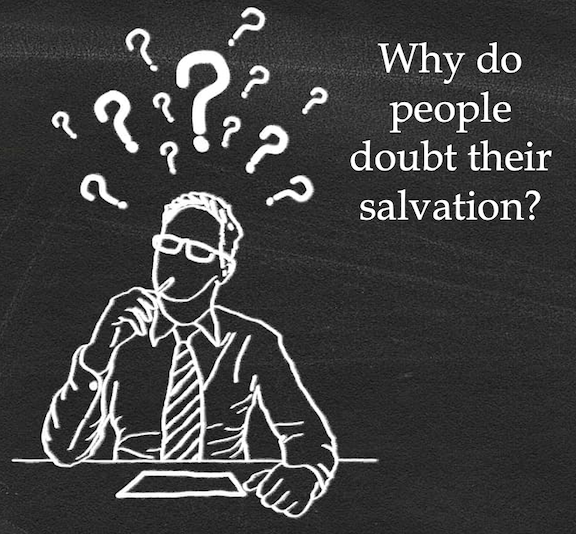
WHY DO PEOPLE DOUBT THEIR SALVATION? [11]
1. THEY’RE DOUBTERS AT HEART. In other words, some people doubt everything. They doubt whether their mates love them or whether their children respect them. They doubt they’ll reach the age of retirement, or that their plane will reach its destination. Such people have issues they must deal with that are far different than eternal salvation.
2. THEY CAN’T POINT TO A SPECIFIC TIME AND PLACE WHEN THEY TRUSTED CHRIST. They know that Christ alone is their only way to heaven, but they don’t remember the exact moment they met their Savior. They wonder, “Could that mean I’m not saved?” They may have been told, “If you don’t know the date you were saved, you’re not saved.” Let me ask you, did Jesus say, “Whoever believes in Him and knows the date they were saved has everlasting life?” No. The real question is, “Whom am I trusting right now to give me eternal life?” Our salvation is established by WHOM we place our trust in, not WHEN we trusted Him.
3. THEY ARE VICTIMS OF TEACHING THAT CONFUSES ENTERING THE CHRISTIAN LIFE WITH LIVING IT. For example, a few years ago I listened to a preacher on the radio say that the book of I John was written to provide tests to see if you are saved. He said to ask yourself, “do I have fellowship with the Father… am I abiding in Him… do I practice sin habitually … do I love other Christians… am I overcoming sin?” If you couldn’t answer “yes” to these questions, then he said you cannot be certain you are saved.
The purpose of I John is NOT to tell you how to become a Christian. Rather, it tells us how to have fellowship or closeness with Christ (I John 1:3-4). The gospel of John tells you how to receive the gift of eternal life, mentioning the word “believe” ninety-nine times (see comments on 1:7b). The book of I John tells us how to get close to the One you have believed in, using the word “abide” (menō) – which means “to remain, stay, dwell, continue” [12] in fellowship with God – twenty-four times in I John (2:6, 10, 14, 17, 19, 24 [3], 27 [2], 28; 3:6, 9, 14, 15, 17 24 [2]; 4:12, 13, 15, 16 [3]. Therefore, closeness to Christ is discussed in I John, not salvation. People who don’t act like a Christian or a disciple may not be a believer. But to use characteristics of a disciple to determine if you’re a Christian isn’t helpful. Some people might live a good moral life without being a Christian. It could be that those people are trusting in their works instead of Christ’s finished work on the cross to get them to heaven.
What, then, should a doubter do? [13] IF YOU DOUBT YOUR SALVATION…
1. ASK YOURSELF, “DO I UNDERSTAND THE SIMPLICITY OF THE GOSPEL? Since Christ made the full payment for my sins when He died on the cross and rose from the dead (John 19:30), God can now forgive me based on what He has done for me, not what I do for Him. His forgiveness isn’t based on anything we have done for Him. As sinners, we must recognize that He alone is the only basis upon which God can receive us.
2. ASK YOURSELF, “HAVE I BELIEVED OR TRUSTED CHRIST ALONE FOR MY SALVATION?” We appropriate Christ’s death on the cross by coming to Him as sinners, recognizing that He made the full payment for sin on our behalf, and “believing.” Jesus promised, “Whoever believe in Him should not perish but have everlasting life” (John 3:16). The word “believe” means to be persuaded that Jesus is speaking the truth and is therefore worthy of our trust (see comments on 1:5). If you are persuaded Jesus is speaking the truth in John 3:16, and are trusting Him alone to give you everlasting life, you are forever God’s child regardless of when or where that occurred.
3. ASK YOURSELF, “AM I TAKING GOD AT HIS WORD?” Once we trust Christ, we must trust His Word. That means accepting God’s promise that, having believed in Christ, we are forever His. If you were to ask me whose son I am, I would say, “I am the son of Allen and Shirley Ropp.” I have proof that would stand up in a court of law – a birth certificate. A piece of paper assures me that I am their son. God has given us a piece of paper – the inspired Word of God, the Bible. It assures us that once we have believed in Christ, we have everlasting life. We are His forever. If you could lose your salvation, then Jesus just lied to us in John 3:16. Our salvation is based upon a promise that cannot be broken. It comes from a God Who cannot lie.
The eighth reason everyone needs John 3:16 is because EVERYONE NEEDS THE GREATEST POSSESSION – “everlasting life.” Eternal life is defined by Jesus, “And this is eternal life, that they may know You, the only true God, and Jesus Christ whom You have sent.” (John 17:3). Eternal life is knowing God the Father and Jesus Christ forever. It is not knowing about them; it is knowing them personally. Eternal life begins when you believe in Him… not when you die or after you die. We can enjoy eternal life three hundred sixty-five days a year, seven days per week, and twenty-four hours per day! What could possibly be greater than that?
Some Bible interpreters insist that the present tense of “believes” (pisteuōn) means a person must continue to believe in Christ until the end of life to go to heaven. If at some point in time they stop believing in Christ, they lose eternal life. But this is not supported by the Greek grammar. [14]
For example, Moulton and Turner state, “Thus in Greek, one seldom knows apart from the context whether the present indicative means, I walk or I am walking.” [15] Often the present tense has a punctiliar meaning. “For example, Matthew 5:22, 28; 9:2 (‘Your sins are forgiven’); 14:8; 26:63; Mark 2:5; Luke 7:8; 12:44; John 5:24; 9:25; Acts 8:23; 9:34 (‘He heals you,’ not ‘is continually healing you’); 16:18; 26:1).” [16]
“Moulton and Turner call attention to the fact that the personal present articular participle ‘the one who believes’ is often used ‘where we would expect aorist.’” [17] “When used that way, they say ‘Action (time or variety) is irrelevant, and the participle has become a proper name.’” [18] “Wallace illustrates from Matthew, ‘Thus, for example, in Matthew 5:28, ‘everyone who looks at a woman’ with lust in his heart does not mean ‘continually looking’ or ‘habitually looking,’ any more than four verses later ‘everyone who divorces his wife’ means ‘repeatedly divorces!’” [19]
Dillow continues by saying, “Perhaps 1 Thessalonians 1:10, ‘Jesus who delivers us from the wrath to come,’ is relevant here. The intent is to describe deliverance from the tribulation wrath. He is not saying that Jesus is the One who continually delivers us from the tribulation wrath. A deliverance once accomplished does not need to be habitually repeated.” [20]
Even if you stop believing in Christ, it does not result in the loss of salvation because that would be contrary to the nature of God’s gift. If everlasting life could be lost, it would no longer be everlasting. The results of believing in Christ are permanent. This is why Jesus said the one who comes to Him or believes in Him “shall never” hunger or thirst for everlasting life (John 6:35). The one who comes to Him in faith “shall be no means be cast out” by Him (John 6:37). Jesus came down to earth to do “the will of Him who sent” Christ (John 6:38). The will of God the Father is “that of all” the believers “He has given” to Jesus, Jesus “should lose nothing” (John 6:39). If any Christian lost his or her salvation, then Jesus would have failed to do His Father’s will. Staying saved is a matter of Jesus doing the Father’s will, not a Christian doing God’s will. The one who believes in Him “shall never perish” nor shall “anyone snatch them out of” His or the Father’s hands (John 10:28-29). Christ guarantees that those who believe in Him “shall never die” (John 11:26). How long is “never”? It is forever. Jesus makes it very clear that the result of believing in Him is permanent. It cannot be undone. If any believer in Jesus Christ ever lost eternal life then Jesus would be a liar.
Dillow illustrates what Jesus is saying in John 3:16: “We might say, ‘Whoever believes that Rockefeller is a philanthropist will receive a million dollars.’ At the point in time a person believes this, he is a millionaire. However, if ten years later, he ceases to believe, he is still in possession of the million dollars. Similarly, if a man has believed in Christ, he is regenerate and in possession of eternal life, even if he ceases to believe in God in the future.” [21]
The Bible assures us, “If we are faithless, He remains faithful; He cannot deny Himself.” (2 Tim. 2:13). God remains faithful to His promise of eternal life to all who believe in Jesus, even if they stop believing or become “faithless.” Why? Because God “cannot deny Himself.” Christ is “full of truth” (John 1:14) and is “the truth” (John 14:6) and cannot deny what He has already promised. To do so would make Him a liar. “His promise is independent of our continued faith or of anything we may do or not do.” [22]
When a person believes in Christ for eternal life, God the Holy Spirit places him or her into the body of Christ the Church, via Spirit baptism (Acts 10:43-48; I Cor. 12:13; Gal. 3:26-27; Ephes. 1:13-14). Hence, Jesus will never deny or reject His own body (cf. John 6:37). Our placement in the body of Christ is permanent.
Charles Stanley writes: “Faith is simply the way we say yes to God’s free gift of eternal life. Faith and salvation are not one and the same any more than a gift and the hand that receives it are the same. Salvation or justification or adoption- whatever you wish to call it – stands independently of faith. Consequently, God does not require a constant attitude of faith in order to be saved-only an act of faith… You and I are not saved because we have an enduring faith. We are saved because at a moment in time we expressed faith in our enduring Lord.“ [23]
Charles Peace was sentenced to die for being a career criminal. On the morning of his execution, a group of prison officials met at Charles’ cell to take him on his final walk to the gallows. Among them was a sleepy prison chaplain whose job it was to prepare the condemned man’s soul for the hereafter. But the chaplain didn’t say a word to Charles. He just yawned and mumbled as he read a religious book.
Charles then tapped him on the shoulder and asked him, “What are you reading?” “The Consolations of Religion” he replied. Charles: “Do you believe what you are reading?” Chaplain: “Well, yes, I guess I do.” Charles stared at the chaplain stunned. Here Charles was going to his death, knowing that his earthly deeds utterly condemned him before the Ultimate Judge, and this chaplain was mouthing words about heaven and hell as if they were a boring chore. Charles said to the chaplain, “Sir, I do not share your faith. But if I did – if I believed what you say you believe – then although England were covered with broken glass from coast to coast, I would crawl the length and breadth of it on hand and knee and think the pain worthwhile just to save a single soul from this eternal hell of which you speak.” [24]
“For God so loved the world that He gave His only begotten Son, that whoever believes in Him should not perish but have everlasting life.” If we believe this verse is true, what are we willing to do to place it in the hands of those who are perishing without Jesus Christ? Are we willing to do whatever it takes for others to trust in Jesus for eternal life?
Prayer: Father God, thank You for John 3:16. Truly everyone needs this one verse because with great simplicity and power it addresses humanity’s greatest needs. Make me willing to do whatever it takes to get this one verse to those who don’t know You so they can enjoy eternity in Your presence forever. In Jesus’ mighty name, I pray. Amen.
FOOTNOTES:
[1] Bauer, A Greek-English Lexicon of the New Testament, pg. 658.
[2] Taken from http://www.worldometers.info/world-population/ on July 2, 2023.
[3] Bauer, A Greek-English Lexicon of the New Testament, pp. 816-817.
[4] Adapted from Charlie Bing, “Demon Faith and the Misuse of James 2:19,” GraceNotes – no. 47 at gracelife.org.
[5] Ibid.
[6] apolētai
[7] Bauer, A Greek-English Lexicon of the New Testament, pg. 116.
[8] Some interpreters believe Revelation 3:5 teaches that unfaithful believers will have their names erased from the book of life. Since Jesus taught that eternal life can never be lost when we believe in Him (cf. John 5:24; 6:35-40, 47; 10:28-29; 11:25-27; et al.), it best to understand the phrase “I will not blot out his name from the Book of Life” to be a figure of speech called a litotes which is an understatement in which a positive affirmation is expressed by negating the opposite. A litotes cannot be read in reverse. That is, if a Christian does not remain faithful to Christ, this statement by Jesus does not mean they would lose their salvation. Christ is speaking about eternal rewards for the faithful Christian. In essence, Jesus is saying, “If you remain faithful to Me to the end of your life, I will reward you with the opposite of having your name blotted out of the Book of Life. You will be given an honored name that is supremely secure and confessed or honored before God the Father and His angels throughout eternity. See “What does Revelation 3:5 Means?” or “Revelation 3 – Part 1” at www.seeyouinheaven.life for more detailed explanations.
[9] Evans, The Tony Evans Study Bible, pg. 2419.
[10] Adapted from Evans, The Tony Evans Study Bible, pp. 1611-1612.
[11] Adapted from R. Larry Moyer, 21 Things God Never Said: Correcting Our Misconceptions About Evangelism (Grand Rapids: Kregel Publications, 2004), pp. 79-81.
[12] Bauer, A Greek-English Lexicon of the New Testament, pp. 630-631.
[13] Moyer, 21 Things God Never Said, pp. 81-83.
[14] Dillow, Final Destiny, pg. 390 cites Fred Chay and John P. Correia, The Faith That Saves: The Nature of Faith in the New Testament (Haysville, NC: Schoettle Publishing Co.), 2008, pp. 45-53.
[15] Ibid., cites James H. Moulton and Nigel Turner, A Grammar of New Testament Greek, Volume 3: Syntax, reprint ed. (Edinburgh: T. & T. Clark, 1963), Vol. 3, pg. 60.
[16] Ibid., footnote 1330.
[17] Ibid., cites Moulton, A Grammar of New Testament Greek, pg. 150. See especially Mark 5:15-16, ho daimonizomenos, even after his healing.
[18] Ibid., cites Moulton, A Grammar of New Testament Greek, pg. 150 and states in footnote 1332: “See also Philippians 3:6 and Hebrews 7:9. Moulton and Turner cite several examples of this aoristic punctiliar used of the articular present participle: Matthew 26:46; 27:40; Mark 1:4; 6:14, 24; John 1:29 (the sin bearer); 6:63; 8:18; Acts 17:17; Romans 8:34; Ephesians 4:28; Galatians 1:23).”
[19] Ibid., cites Daniel Wallace, Greek Grammar Beyond the Basics (Grand Rapids: Zondervan Publishing House, 1996), pg. 616. In footnote 1333, Dillow states, “In spite of Wallace’s recognition that with gnomic present articular participles ‘we would be hard-pressed to make something more out of them – such as a progressive idea,’ he allows his theology to intervene in the case of ho pisteuōn in John (see Wallace, pp. 616, 620-621).”
[20] Ibid.
[21] Ibid.
[22] Robert N. Wilkin, J. Bond; Gary Derickson; Brad,Doskocil; Zane Hodges; Dwight Hunt; Shawn Leach; “2 Timothy,” The Grace New Testament Commentary: Revised Edition (Grace Evangelical Society, 2019 Kindle Edition), pg. 492.
[23] Charles Stanley, Eternal Security, Can You Be Sure? (Nashville: Oliver Nelson, 1990), pg. 80.
[24] Roy B. Zuck, The Speaker’s Quote Book (Grand Rapids: Kregel Publications, 1997, 2009), pg. 251.


